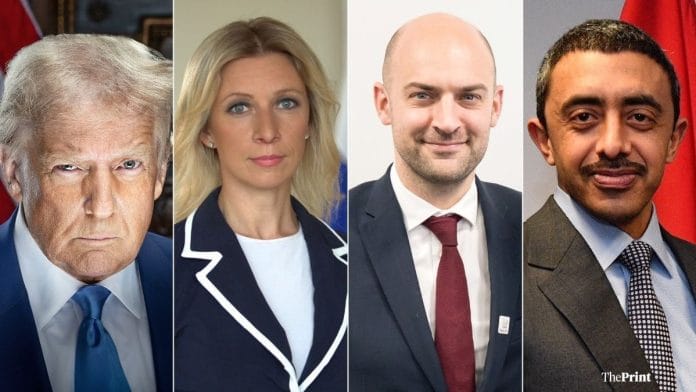New Delhi: Global leaders have urged restraint and de-escalation following India’s precision strikes against nine sites in Pakistan during Operation Sindoor early Wednesday, marking a sharp escalation in regional tensions. Leaders from the US, China, France, Russia and the United Arab Emirates (UAE) have weighed in on the developing crisis, while Türkiye has openly declared support for Pakistan.
United States President Donald Trump, addressing the media early Wednesday, expressed hope that the situation “ends very quickly”, adding that he had been aware “something was going to happen”. United States Secretary of State and interim National Security Advisor Marco Rubio, after speaking with his counterparts in both India and Pakistan, urged the two nations to “avoid escalation”.
Indian National Security Advisor Ajit Doval briefed Rubio following Operation Sindoor, which was conducted between 1:05 am and 1:30 am Wednesday, explained Colonel Sofiya Qureshi during a special briefing on the operation.
Senior Indian officials also engaged with their counterparts in the United Kingdom, UAE, Russia and Saudi Arabia. The precision strikes targeted nine terrorist camps, including the Markaz Taiba in Muridke, about 25 km from the international boundary, and the Markaz Subhan in Bahawalpur, located approximately 100 km from the border, according to PIB.
China, the second permanent member of the United Nations Security Council (UNSC), described Operation Sindoor as “regrettable” and urged both India and Pakistan to demonstrate restraint, according to a foreign ministry spokesperson. Beijing, a staunch supporter of Pakistan, has invested billions into the China-Pakistan Economic Corridor (CPEC).
Maria Zakharova, spokesperson for the Russian Foreign Ministry, stated on Telegram, the messaging platform, that Moscow “strongly condemns acts of terrorism, opposes any manifestations of it and emphasizes the need to unite the efforts of the entire world community to effectively combat this evil.
“We call on the parties involved to exercise restraint in order to prevent further deterioration of the situation in the region. We hope that the differences between New Delhi and Islamabad will be resolved peacefully,” Zakharova added.
The Russian foreign ministry also underscored the importance of resolving the issue on a bilateral basis as outlined in the Simla Agreement of 1972 and the Lahore Declaration of 1999.
The fourth UNSC permanent member to call for restraint is France.
In an interview with a local television channel, French Foreign Minister Jean-Noël Barrot said, “We understand India’s desire to protect itself against the scourge of terrorism, but we obviously call on both India and Pakistan to exercise restraint to avoid escalation and, of course, to protect civilians.”
United Nations Secretary-General António Guterres is “very concerned” about the Indian military operations “across the Line of Control and the international border”, stated his spokesperson.
The spokesperson added, “He calls for maximum military restraint from both countries. The world cannot afford a military confrontation between India and Pakistan.”
India’s Operation Sindoor was launched in response to the terrorist attack in Jammu and Kashmir’s Pahalgam, which killed 26 tourists, including 25 Indian nationals and one foreign national, on 22 April. Indian Foreign Secretary Vikram Misri said Wednesday that intelligence assessments have linked the attack to The Resistance Front, a frontal unit of the Pakistan-based Lashkar-e-Taiba.
The UAE, Australia, Israel and Türkiye have also responded.
Another key Indian partner, the UAE, called for restraint in a statement issued early Wednesday.
“His Highness Sheikh Abdullah bin Zayed Al Nahyan, Deputy Prime Minister and Minister of Foreign Affairs, has called on the Republic of India and the Islamic Republic of Pakistan to exercise restraint, de-escalate tensions, and avoid further escalation that could threaten regional and international peace,” the UAE’s statement said.
It continued, “His Highness stressed the importance of heeding the voices calling for dialogue and mutual understanding to prevent military escalation, strengthen stability in South Asia, and avoid further regional tensions. His Highness reaffirmed that diplomacy and dialogue remain the most effective means of peacefully resolving crises, and achieving the shared aspirations of nations for peace, stability, and prosperity.”
A spokesperson for the Australian Minister of Foreign Affairs Penny Wong said Canberra does not wish to “see escalatory actions, which pose a risk to regional peace and security.”
Israel’s Ambassador to India Reuven Azar, in a statement Wednesday, affirmed that Tel Aviv supports New Delhi’s “right to self-defence”, adding that terrorists “should know” there is “no place to hide.”
However, Türkiye, a member of the North Atlantic Treaty Organization (NATO) and a close ally of Pakistan, expressed solidarity with Islamabad over India’s “unprovoked act of aggression”, according to a statement from the Pakistani Ministry of Foreign Affairs. Türkiye’s Foreign Minister Hakan Fidan held a call with his Pakistani counterpart Ishaq Dar early Wednesday.
(Edited by Radifah Kabir)
Also Read: Fidayeen factories of Lashkar-e-Taiba in Muridke, Jaish in Bahawalpur targeted in Operation Sindoor






